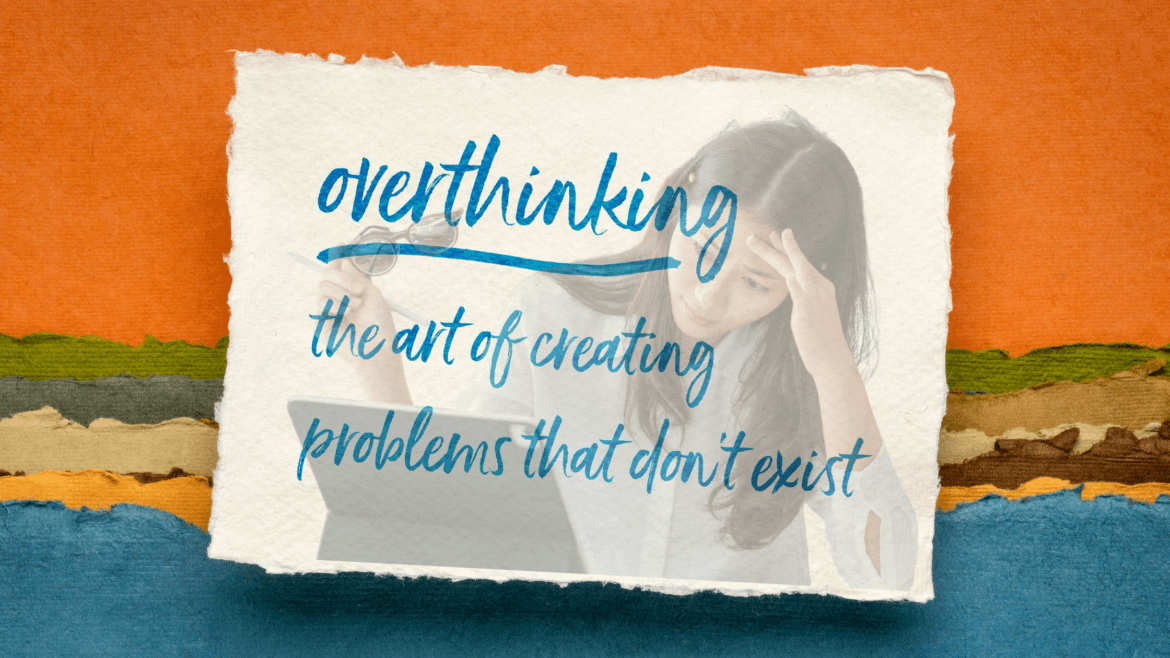Overthinking
If you’ve experienced your mind endlessly replaying anxieties and “what-ifs,” you’re familiar with overthinking. This common phenomenon involves a persistent cycle of repetitive and intrusive thoughts, often draining energy and contributing to heightened stress levels.
Overthinking can feel like being trapped on a negative merry-go-round, impacting various aspects of life, including relationships, work, and overall well-being. But fear not, reclaiming control of your thoughts and fostering inner peace is absolutely achievable.
Let’s embark on a journey to dismantle this overthinking monster, using 10 effective strategies to silence the inner critic, embrace the present, and cultivate mental well-being.
1. Unmask the Culprits: Destructive Patterns and ANTs
Overcoming overthinking starts with understanding the root cause. Often, it’s fueled by destructive thought patterns, like Automatic Negative Thoughts (ANTS) – those pesky, distorted whispers that paint the world in shades of gray. These ANTs can take many forms: catastrophizing (“This presentation will be a disaster!”), mind-reading (“They must think I’m incompetent.”), or personalization (“Everything bad is my fault.”). Recognizing these patterns is crucial, as they act like tripwires, triggering the overthinking spiral.
Example: Waiting for a job interview? Your mind might bombard you with ANTs like, “They won’t choose me.” Challenge them! Are they based on evidence or fear? Have you considered your strengths? Acknowledge their presence and replace them with empowering thoughts.
2. The Art of Distraction: Stepping Out of the Loop
When the overthinking storm threatens to take over, sometimes the best way to fight back is by distracting yourself. Engaging your senses in activities that demand your full attention can help break the negative cycle and give your mind some breathing room. Immerse yourself in a book, lose yourself in a workout, or unleash your creativity through art. By shifting your focus, you interrupt the negative cycle and allow your mind to breathe.
Example: Tangled in a web of self-doubt or feeling anxious about a social event? Instead of ruminating, lace up your sneakers and hit the pavement for a brisk walk or jog. The fresh air and change of scenery will work wonders, while the physical exertion releases endorphins – natural mood boosters that combat negativity and promote well-being.
3. Pen It Down: Journaling for Self-Awareness
Sometimes, simply putting your thoughts on paper can be incredibly therapeutic. Journaling allows you to express your worries without judgment, providing valuable insight into recurring themes and patterns in your overthinking. As you write, you cultivate self-awareness, becoming more attuned to your triggers and inner critic.
Example: Dedicate 15 minutes daily to journaling. Write freely about your thoughts and feelings. Don’t censor yourself – authenticity is key. As you reread your entries, you might identify patterns in your triggers, allowing you to develop proactive coping mechanisms.
4. Mindfulness: Anchoring Yourself in the Present
Overthinking often takes us hostage in the past or future, leaving us disconnected from the present. Mindfulness practices, like meditation or deep breathing exercises, can be your anchors back to reality. By focusing on your breath, bodily sensations, and surrounding sounds, you cultivate present-moment awareness, interrupting the overthinking cycle and fostering a sense of calm.
Example: Find a quiet space and sit comfortably. Close your eyes and focus on your breath, noticing its rise and fall. Feel the air entering your nostrils and the warmth filling your lungs. If your mind wanders, gently bring it back to your breath without judgment. Even 5 minutes daily can significantly reduce stress and overthinking.
5. Solution-Focused Thinking: Shifting from Worry to Action
Instead of endlessly replaying problems, empower yourself by shifting your focus to solutions. Ask yourself, “What steps can I take to address this?” Taking action, even small steps like researching options or making a plan, can break the cycle of helplessness and empower you to navigate challenges constructively.
Example: Feeling overwhelmed by a work project? Break it down into smaller tasks. Make a list, prioritize, and set realistic deadlines. Taking action reduces overwhelm and fosters control, both of which can significantly reduce overthinking.
6. The Power of Connection: Finding Support and Sharing Burdens
Talking about your worries and anxieties with trusted friends, family, or a therapist can be immensely helpful. Sharing your inner struggles not only offers emotional support but can also provide alternative perspectives you might not have considered. Remember, you don’t have to face challenges alone.
Example: Feeling stressed about an upcoming family gathering? Talk to a close friend or family member who understands your concerns. They might offer a reassuring perspective, practical advice, or simply lend a listening ear. Sharing your worries can lighten the burden and empower you to approach the gathering with more confidence.
7. Decision Fatigue: Taming the Choice Overload Monster
Feeling overwhelmed by endless decisions, from what to eat to which career path to choose? You’re not alone. Decision fatigue can fuel overthinking and leave you feeling paralyzed. To combat this, set clear criteria for decision-making and stick to them. This frees up mental space and reduces overthinking.
Example: Struggling to choose between two job offers? List your priorities and values (work-life balance, salary, company culture). Evaluate each offer against your criteria and make a decision based on what aligns best with your long-term goals. This structured approach prevents decision fatigue and empowers you to make a confident choice.
8. Self-Compassion: Embracing Kindness and Forgiveness
Be kind to yourself! We all make mistakes and overthink sometimes. Forgive yourself for getting caught in the thought tornado, acknowledge the effort you’re putting in to manage it and focus on learning from the experience. Self-compassion is key to building resilience and navigating challenges with grace.
Example: Did you snap at a loved one due to overthinking anxieties? Don’t beat yourself up. Instead, apologize sincerely, explain how your overthinking contributed to your behavior, and offer to work on managing it together. Self-compassion allows you to learn from your mistakes without shame and fosters healthier relationships.
9. Celebrate Small Victories: Boosting Motivation and Acknowledging Progress
Don’t underestimate the power of celebrating small wins! Recognizing and appreciating your progress, no matter how seemingly insignificant, fuels motivation and reinforces positive change. Did you manage to go for a walk instead of dwelling on worries? Did you say “no” to something that would have caused you stress? Celebrate these successes!
Example: Every evening, write down three things you’re grateful for, including small victories related to managing your overthinking. This practice cultivates a positive mindset and reminds you of your progress, motivating you to continue your journey toward mental well-being.
10. Seeking Professional Help: Embracing Support and New Tools
If overthinking significantly impacts your daily life and mental health, consider seeking professional help. A therapist can provide valuable tools and strategies to manage your thoughts and emotions more effectively, teaching you mindfulness, stress reduction techniques, and how to challenge ANTs. Remember, seeking help is a sign of strength and self-care.
Example: Feeling overwhelmed by intrusive thoughts and anxiety that interfere with your daily life? Consider connecting with a licensed therapist experienced in cognitive-behavioral therapy (CBT). Therapists can equip you with tools like cognitive restructuring and exposure therapy to manage your overthinking and cultivate healthier thought patterns.
Conclusion:
Remember, silencing the overthinking storm within takes time and dedication. Don’t get discouraged by setbacks; view them as opportunities to learn and refine your approach. Celebrate your progress, no matter how small, and be kind to yourself throughout the journey.
By incorporating these strategies into your daily life, you’ll gradually cultivate the inner strength and self-awareness needed to break free from the overthinking cycle and embrace a more peaceful, present mind. So, take a deep breath, release the reins of your thoughts, and embark on your path to reclaiming your mental well-being. Remember, you are not alone in this, and with consistent effort and self-compassion, you can achieve lasting peace and control over your thoughts. Now go forth and conquer your thought tornado.
Further Recommendations:
- Stop Overthinking by Nick Trenton. This book offers 23 techniques to relieve stress, stop negative spirals, declutter your mind, and focus on the present (The Path to Calm).
- Women Who Think Too Much by Susan Nolen-Hoeksema. This transformative guide explores the causes of overthinking, its detrimental effects, and offers practical strategies for women to break free from negative thought cycles. An empowering read for reclaiming life and overcoming constant self-analysis.
- Unfu*k Yourself by Gary John Bishop is a no-nonsense guide to overcoming self-imposed limitations, demolishing negative self-talk, and leading the life you were meant to have. With seven powerful assertions, this transformative book offers the tools needed to break free from negative self-talk and unleash your full potential. A must-read for those ready to embrace change and lead the life they were meant to have.
- Forgiving What You Can’t Forget by Lysa TerKeurst, guides you through a transformative journey to overcome pain, release resentment, and find peace. Learn to move on, embrace forgiveness, and create a beautiful life.
- Master Your Emotions by Thibaut Meurisse is a practical guide with 31 coping strategies, a mind-reprogramming formula, and a free downloadable workbook. Transforming over 300,000 lives, it offers a no-frills approach to achieving a happier life. Get it now and take control of your emotions.

